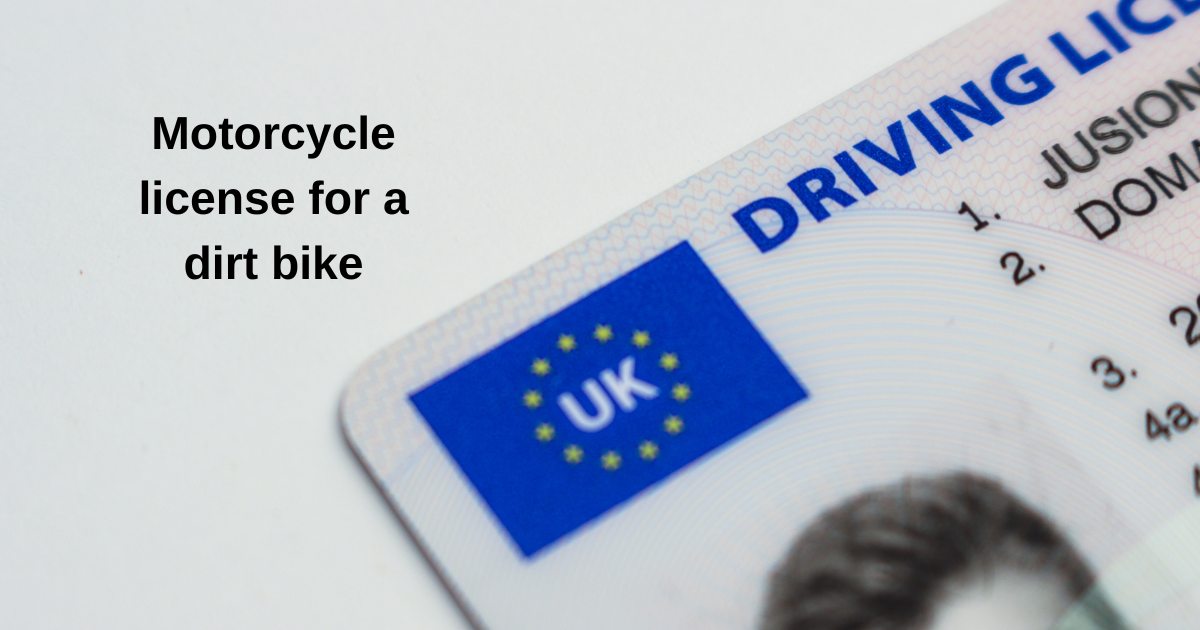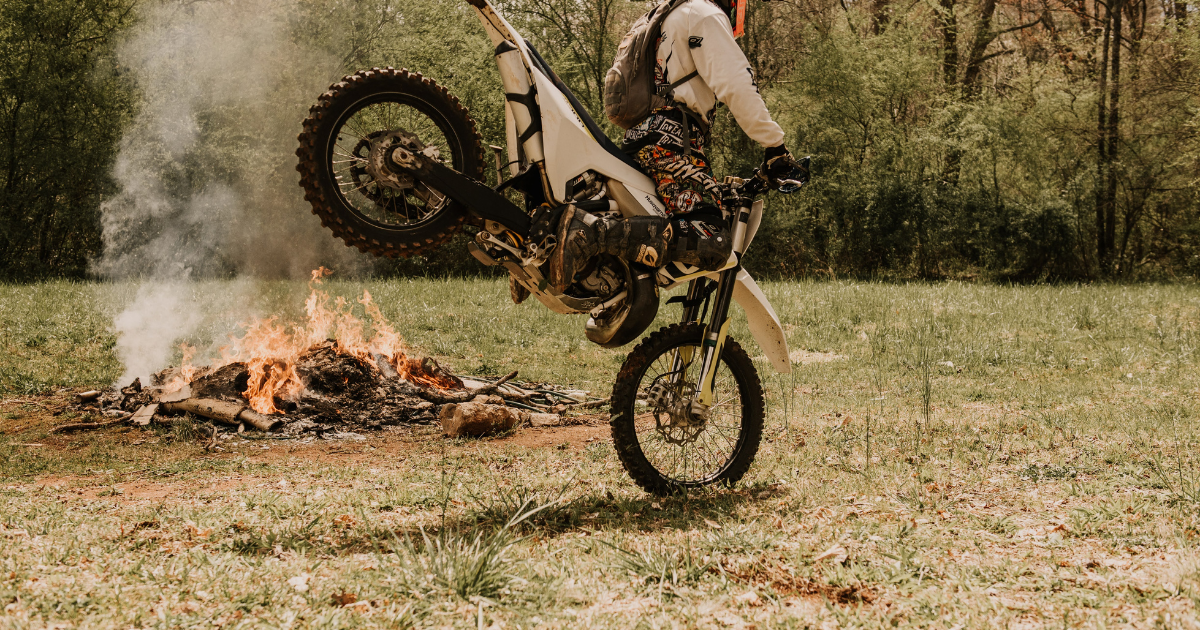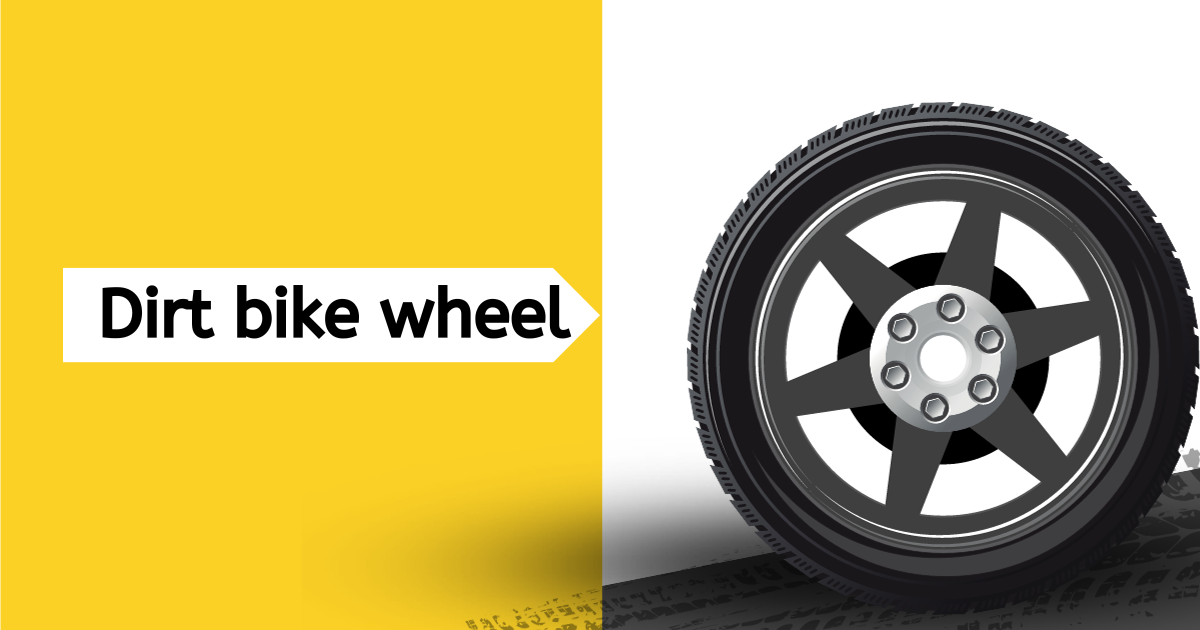Riding dirt bikes can be thrilling and exhilarating, but it’s crucial to remember that they come with risks. Without proper training and the right license, you could potentially find yourself in harm’s way or even face serious injuries. To ensure your safety and preparedness for any scenario while riding your off-road motorcycle, we have compiled a list of frequently asked questions regarding dirt bikes and the necessary licenses.
Motorcycle license for a dirt bike
Riding a dirt bike may not require a specific motorcycle license. If you already hold a valid motorcycle license, it will also cover your off-road biking activities. However, if you plan on riding your dirt bike on public roads, then yes, you will need to obtain a motorcycle license.
If you own a street bike and wish to ride it off-road, you will need an off-road motorcycle license. However, if you do not possess one and intend to ride your dirt bike on the street, then yes—you will require a license.
The distinction between a street bike and an off-road motorcycle primarily lies in their intended use. A street bike is designed for riding on paved roads, while an off-road motorcycle is specifically built for rugged terrains such as dirt trails or wilderness areas. Consequently, if you own a street bike but wish to venture off-road, it becomes necessary to obtain an off-road motorcycle license. On the contrary, if you possess a dirt bike and aim to ride it on public streets, then indeed, you will require a proper license.
How can I get a license for my dirt bike
If you’re interested in riding a dirt bike, there are a few requirements that you need to meet. First and foremost, you must be at least 16 years old. Additionally, you’ll need to successfully complete an approved motorcycle safety course and obtain your certificate of completion. Lastly, you’ll need to pass both the written test and practical road test at any DMV location in order to obtain your motorcycle license issued by law enforcement officials in your state.
After obtaining your motorcycle license, it is crucial to ensure that your bike is in excellent condition before embarking on your journey. Whether you own a new or older model, it’s important to address any necessary maintenance and inquiries. If you have any uncertainties regarding the preparations required for hitting the road, consulting an experienced individual with knowledge about motorcycles would be wise.
In addition, it is important to have the appropriate gear for safe riding. This includes wearing a helmet and goggles or glasses to protect your head and eyes. It is also crucial to wear protective clothing to safeguard against any potential injuries. If you are using public roads, make sure that all the lights on your bike are functioning correctly. Once you have ensured that everything is in order, you can confidently embark on your journey!
You may not need a motorcycle license to ride a dirt bike.
To ride a dirt bike on the street in most states, you will need to obtain a motorcycle endorsement on your driver’s license. However, some states do allow riding without an endorsement if it is strictly for off-road use. For example, in Colorado and Florida, there are no restrictions on who can operate an off-highway vehicle (OHV) like an ATV or dirt bike as long as they are at least 18 years old and have completed an approved safety course within the past two years.
In states like Alabama, California, and Georgia, individuals under 21 years old who want to ride off-highway vehicles (OHVs) for commercial or recreational purposes are required to apply for an operator permit. They must also pass tests that cover topics such as basic vehicle control skills before being granted any type of license. This license allows them access beyond private property boundaries where traffic laws may not apply, except for safety precautions like wearing helmets while riding outside city limits but within the jurisdiction’s limits. It’s important to note that these requirements can vary depending on the state, so it’s recommended to check with local authorities before deciding whether getting certified would be beneficial personally.
Can I use a regular motorcycle license to ride my dirt bike
Absolutely, you can legally ride your dirt bike with a regular motorcycle license. It is a requirement to have a regular motorcycle license in order to ride one.
– To legally ride this, you need a standard motorcycle license. – You can only ride on privately owned land that is not accessible to the public.
– To ride legally, you need to have a regular motorcycle license. – Riding is only allowed on private land that is not accessible to the public.
To legally ride a motorcycle, it is important to keep in mind that you can only ride on privately-owned land that is not accessible to the public. Additionally, possessing a valid regular motorcycle license is necessary to ensure legality.
– Riding off-road motorcycles is only permitted on private land that is not accessible to the general public. – It is essential to possess a valid motorcycle license to comply with legal requirements. – Remember that riding off-road motorcycles is restricted to private land that is not open for public use.
What if I don’t have my own dirt bike
If you don’t own a dirt bike, there are several options available to you. You can consider renting one or borrowing one from a friend. Alternatively, if you’re interested in purchasing your own dirt bike, it’s advisable to buy from a reputable local dealer who has extensive knowledge about their products. This will greatly simplify the entire process and ensure a smooth experience, including setting up insurance coverage if needed.
After getting your dirt bike, it’s crucial to undergo proper training. The most recommended approach is enrolling in a reputable dirt bike safety course offered by organizations like BRC or MSF. These courses provide essential knowledge and skills for safe riding and off-road adventures.
This is a reliable method to guarantee your safety while riding and will ultimately simplify things for you in the future.
Riding on the street requires a proper motorcycle license.
Using a dirt bike for transportation is not feasible. It cannot be used to commute to work or school without violating traffic laws and facing potential legal consequences.
Dirt bikes are not permitted for road use due to their lack of required safety features such as brakes and lights. Riding a dirt bike without the necessary documentation and registration can result in hefty fines, fees, and potential jail time if convicted of operating without proper legal requirements. It is crucial to ensure all necessary measures are in place before riding a dirt bike to avoid any legal complications or encounters with law enforcement officers who actively patrol areas in search of individuals violating traffic laws such as driving without valid licenses or registration tags affixed to their vehicles.
What is the difference between a street bike and an off-road motorcycle?
Street bikes and off-road motorcycles have distinct differences. The most notable contrast lies in their design: street bikes are built for riding on paved roads, while off-road motorcycles are specifically designed for unpaved roads or trails. This distinction in purpose also leads to differences in suspension systems and the ability to handle rough terrain.
One key difference is the speed of street bikes compared to off-road motorcycles. Street bikes are designed to prioritize speed and efficiency in getting from one location to another, while off-roaders primarily focus on transportation without the need for high speeds.
Understanding these distinctions is crucial when considering a motorcycle purchase. If your goal is to ride on paved roads, then a street bike would be the most suitable option. However, if you are interested in off-roading adventures, an off-roader would be the ideal choice.
How do I get a motorcycle license in Washington state?
To obtain a motorcycle license, you must successfully complete a multiple-choice knowledge test at any DMV office. This test evaluates your understanding of traffic laws, safe riding practices, and the impact of alcohol on driving skills. Additionally, if you have not obtained an enhanced ID card or driver’s license in the past five years, you will need to pass a vision screening test.
If you’re under 18 and looking to ride dirt bikes in Washington state without parental permission or if your parents refuse, there are some exceptions to consider:
- Alternatively, if both parents provide a signed affidavit expressing their desire for their child to receive motorcycle training and explaining the potential benefits.
Where Can You Drive Your Bike Without a Dirt Bike License?
- When it comes to private property, the owner has the right to permit or prohibit bike riding on their land. If they choose not to allow riders, they have the authority to enforce that restriction.
- In certain states, such as California and Nevada, public lands are available for motorcycle riding to individuals with a motorcycle license or permit (details below). However, in states like Colorado and New Mexico, access is restricted based on designations by local authorities. Only riders with OHV licenses/permits can enter these areas without violating any laws themselves!
Can You Ride Dirt Bikes in Residential Areas?
- Please ride the bike responsibly and considerately, ensuring that you do not pose any danger or inconvenience to others.
- To ride a dirt bike legally, it’s important to know that public property like parks or school grounds are off-limits unless they have specifically been designated as legal areas for off-road riding, such as an authorized off-road park.
Riding a dirt bike on public roads without proper designation is illegal in many states. If caught, individuals may face tickets or even arrests.
The regulations surrounding riding a dirt bike in residential areas differ from state to state. While some states do not have specific laws regarding the use of dirt bikes, others require riders to adhere to certain guidelines. For instance, wearing protective gear, such as helmets and eye protection, may be compulsory in some states when riding a dirt bike in a residential area. Additionally, riding at night or on public property like parks or school grounds may be prohibited unless it is specifically designated by law as permissible (e.g., an off-road park).
Requirements To Make a Dirt Bike Street Legal or Dual Type
- To obtain a title for your dirt bike, you can visit any DMV office or complete the process online through the state’s website. Remember to also fulfill any necessary tax payments.
- Obtain a license plate by visiting your local DMV office or accessing the state’s website. Please note that registration fees will apply.
- You will need to be 16 years old.
- You will need to get a motorcycle license.
- You will need to get insurance for your bike.
You can easily obtain a helmet at any bike shop. To ensure your safety, it is also recommended to invest in riding gear such as gloves and goggles. Additionally, learning basic maintenance tasks like oil changes and tire repairs will allow you to take care of your dirt bike on your own.
FAQs
Do you need a motorcycle license for a dirt bike?
If you want to ride your dirt bike on public roads or property, you’ll need a specific license for off-road vehicles. A regular driver’s license won’t be sufficient in this case.
How can I get a license for my dirt bike?
To get started, find a reputable motorcycle training school near your area that offers comprehensive education on operating various types of motorcycles, including ATVs and UTVs (utility vehicles). Upon completing the coursework and passing the exam, you can then apply for the specific endorsement or permit in your state at your local Department of Motor Vehicles (DMV) office. Please note that certain states may require additional fees for obtaining this endorsement, while others do not charge any fees at all.
Yes, you can legally ride a dirt bike if you have the appropriate endorsement or permit on your driver’s license. However, it’s important to be aware that the process for obtaining this endorsement may differ depending on your state. It is recommended to contact your local DMV office for specific information and requirements before attempting to ride a dirt bike. If you’re looking for more details regarding motorcycle laws and regulations in your state, please visit our page dedicated to providing comprehensive information on this topic.





